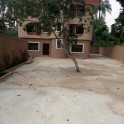How do you survive a holocaust, I remember asking myself. When you see a child, you don't expect them to grow up. You expect them to stay small and ask “why” until you run out of reasons to give them. You expect them to spill milk and cry and you teach them to clean it up. You expect them to be scared of the dark and the boogyman, so you look under the bed and in the closet to show them that there's nothing there. But the child eventually learns how to drink without a sippy cup. And the child stops asking “why” and stops wondering because it knows what curiosity does. And they learn that there are things much scarier than the boogyman and the dark. “Let's go see Papa,” my dad calls from the front door. I grab my sandals and meet him at the bottom of the stairs. We exit the tall iron spiked front gates and begin walking down a dirt road. The air in Nigeria is thick with sand. I cough, struggling to keep up with my dad. He walks two steps ahead, his lungs unfazed. “Edewu,” the villagers greet us as we march. Their igbo dialect rolls off their ounce. The word is one of the very few I've learned during my visit. I think it means ‘blessings.' I return the greeting with a wave and half a smile. My dad leads the way, slipping past the crowds of people and their blessings, sparing no time for friendly small talk. The walk is only but five minutes. A direct path from my dad's house to his dad's house; a lifeline of sorts. My dad is the oldest son of eight children. “Your uncle Charlie lives over there.” He points to the left at a sky blue house hidden behind a collection of palm trees. I nod. I've never seen my uncle Charlie before. His house is a snapshot of sibling rivalry the way his is built one story taller than my dad's three story flat. My dad takes my hand in his and we cross a gravel road. The buzz of mopeds and motorcycles rush past us barely missing our heels. My dad looks to the right at a run down mud house shaded with rusted tin sheets. “Your uncle Sabinus lived here. They murdered him. Poison.” All the houses of my relatives line the dirt path like a museum of his childhood, their houses as empty as skeletons. His tongue doesn't slip when it speaks of poison. He doesn't stutter or cry. He soldiers on ahead to copper gates and thrusts open the doors to his father's compound. A monopoly of mud houses scatter the lot placed so tightly together they nearly stand atop each other. A broken down Mercedes marks the entry way to my dad's childhood home. The first car he ever learned how to drive, a dusty relic of his past. Two graves sit at his feet. Taking a handkerchief from his pocket he wipes down the first. “Mazi Vitalis Nweze Nwocha” the inscription reads. My grandfather. He bows his head in silent prayer. “Your grandfather was a fugitive of the war. They annihilated us. Burned us alive like sacrificial animals.” My dad says “they strapped people to military vehicles while their lower limbs dragged helplessly beneath them. I was only 12 at the time.” I stay silent. He tells me about the Birafian War. How Nigerian soldiers raided houses in the middle of the night with machetes, painting walls scarlet. How as a kid, he built a bunker big enough for nine people in the back of his house to hide his father from being recruited into the Birafian army. My dad is 64 now. He dusts off hid hands and pockets his handkerchief sweeping fours years of bloodshed back under the rug. We turn to leave his compound passing more unmarked graves on the way out. I look at him, realizing for the first time how silent it really is when a heart breaks. As kids we are taught not to cry over spilt milk. The war taught my dad not to cry over blood either.
“Oye, choca, que lindos tus ojos,” a middle-aged man called out to me from his small, beaten up car on the small dirt road I dread walking on so much. This was not the first superficial comment I had gotten that day. Most cat calls directed towards me came from large, unkempt men whose appearance alone caused me to feel fear and unease. I hurried without giving him a glance for fear of fueling the fire that was his acute need for attention that he may go to desperate measures to quench. All my life, I had never been allowed to play out on the street with my friends. I had never been allowed to do something as simple as walk to the little corner store half a block away to buy a few eggs alone. I always needed an adult by my side, and even that was not a guarantee of my safety. As a young child, I had been taught to divert as much attention as I could away from who I truly was. This was done by simple things such as never speaking English in public, never looking people on the street I did not know in the eye, never going out without an adult - preferably a Bolivian man, and by dressing in an attempt to hide some of my snowy skin. Even my best efforts at blending in could not keep all the attention away; cat calls were a common experience to me for as long as I can remember, and this put an inevitable fear in my mind of men. For this reason, getting as far away from that man on the street as possible was my only concern in that moment. As soon as I got far enough away for me to feel comfortable, I remembered the reason I was walking; my mom was waiting for me at the other end of the street to catch a “micro” - a public transportation bus. My mind settled instantly at the sight of my strong, beautiful, Bolivian mother, and all the fearful thoughts that seem to short circuit my brain disappeared for a split second that did not last anywhere near long enough. As soon as I reached my mom's side, she spotted the micro heading towards us. She reminded me to keep my bag in front of me since the risk of either getting something stolen or getting inappropriately touched were high if I did nothing to prevent it. Consequently, I stayed by my mom's side as she paid the bitter, overweight driver who had already stepped on the gas pedal again. No seats were available, so we stood in the overcrowded bus until we reached the “abasto” - a vast market in which one can buy fresh food; cheap materials; and agricultural goods. Immediately after stepping off the bus, I was hit with the seemingly origin-less, inescapable stench. I mindlessly followed my mom through the weaving market that seemed to never be the same as she searched for the perfect bunch of bananas for her banana bread. On the side of one of the endless numbers of small fruit stands, there was a little girl sitting under a truck in an attempt to escape the powerful sun that so violently beat on everyone who dared stand directly under its rays. She looked up from the corn husks she was playing with to observe the unusual sight of a white girl with green eyes. A teenage girl sat in the bed of the truck with one leg carelessly hanging off the side. Contrary to the child's simple way of achieving entertainment, her fingers vigorously flew across the glossy screen of her small cellphone. Unlike the child, the teenager barely glanced at me, and as soon as she saw that I was just another girl, her phone retook her attention. The little girl, however, was still mesmerized by my appearance, so I smiled which seemed to satisfy her as she immediately smiled back and returned to playing with anything she could find. Meanwhile, my mom had decided that she had found the bananas that she wanted, so she asked the middle-aged woman standing behind them how much they costed. The woman, dressed in faded clothes and a threadbare apron in which she kept the money she had earned, readily recognized my fair colored skin and naturally assumed that I was not Bolivian and, therefore, ignorant. She chose to take a chance at gaining more money by charging us extra; however, we were used to being charged extra a countless amount of times due to the fact that I was different. My mom convinced the woman to charge us the honest amount of how much the bananas were worth, and we kept walking through the abyss. After an hour, we got on a micro and returned home - one of the few places I felt safe. This short trip had not brought about any terrible events; however, the possibility of being taken advantage of due to irrelevant and superficial things was a constant likelihood in my life. I have grown up trying to hide who I am because of a fear of those who I do not know, but I have never seen it as a fully negative thing because being different means that I am special; the unwanted attention is simply due to everyone around me recognizing that. Maybe, just maybe, someday I will be free to be whoever I want to be without a threat. For now, I live as a minority in what I consider to be my own culture.









